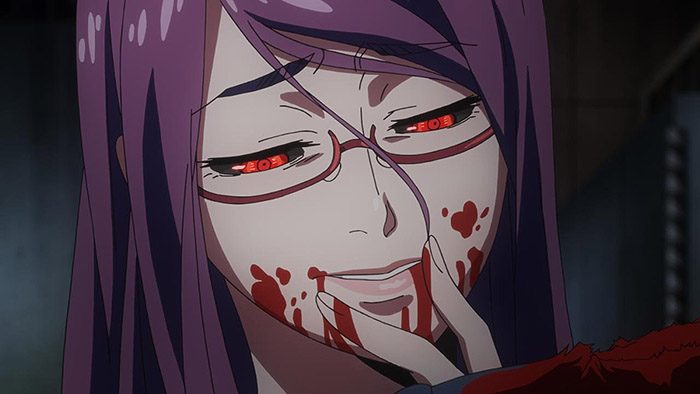
My list of top anime is exceedingly basic, in the sense that nearly all of the anime listed are acclaimed. Despite that, I make no apologies. To deny these shows a place in my heart would be impossible; believe me, I’ve tried, and yet despite my best efforts they’ve continuously wormed their way past my cool exterior and turned me into a huge, giant raging weeaboo. I didn’t have to search hard to find these; rather, these shows seemed to find me. As I’m the type of person who hardly goes out of my way for anything, let alone spending time searching for a new TV show, it seems like fate that they’ve become so important despite my own intentions.
The shows on these list are dark, often possessing characters that are lovable due to their gruff personalities and the realistic manners in which they tackle their problems. Life never fixes itself just because they want it to. Indeed, all of the shows have an unsatisfying ending that, at the time when I was watching, angered me incredibly. For at least two of these shows, I’ve frantically searched for news of an upcoming season the moment the final episode finished, to no avail. But it is precisely that type of engagement that I enjoy the most in these shows, and why there are the top 5 anime that changed my life.
5. Tokyo Ghoul
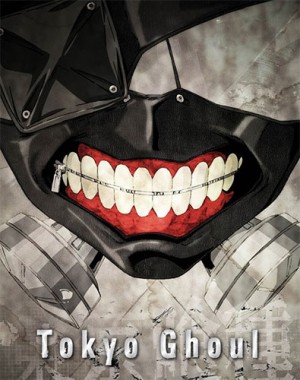
- Episodes: 12
- Aired: Jul 4, 2014 to Sep 19, 2014
Brooding and emotional, Tokyo Ghoul is the anime that a middle school version of myself would have loved to watch. Yet the present version of myself was still obsessed with it, despite missing out on the peak adolescent age of angst in which to best enjoy it. Not bashful about using violence in the show, Tokyo Ghoul is always tasteful with providing a reason behind the gore. I can’t explain the reasons behind my unjustified love for Tokyo Ghoul. It doesn’t grip me psychologically like the other anime on this list, nor does it receive as much universal acclaim. While many viewers are fans of the show, others argue it pales in comparison to the manga (which admittedly, I have never read) and is a weak attempt at a dark style.
Even before I watched the show, I had learned how to play an acoustic version of the intro on guitar. So before long, I could no longer deny watching it. And, while not as emotionally powerful as the other anime on this list that impacted me, there is a certain vulnerability in Kaneki’s transformation that gripped me. The stitching that holds the character’s sanity together at the seams, seems always on the verge of unraveling, and it is this impreciseness that remains compelling. Regardless of what it is about this show, I will always look back upon it fondly.
Tokyo Ghoul Trailer
4. Princess Mononoke
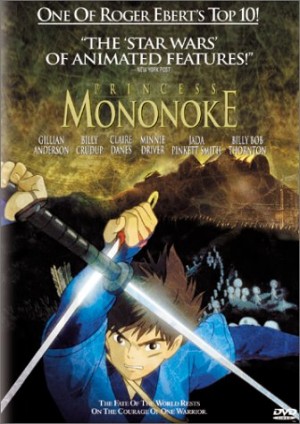
- Episodes: 1 (Movie)
- Aired: Jul 12, 1997
While technically an animated film whose definition falls somewhere between the grey definitions of what actually constitutes an anime (and whose creator, Hayao Mizayaki, is famed for saying that anime is a mistake), this movie was critical in my formative years, before I thought of anime as anything other than foreign cartoons. My grandmother —my poor, sweet, precious, darling grandmother— had went to the library and picked out every VHS she could possibly find that seemed like a children’s movie. And perhaps, in her eyes, any sort of animation was deemed suitable for a child. So, unknowingly, she had grabbed Princess Mononoke, and brought it home to her sweet, impressionable grandchildren, who were around 5 and 8 respectively. And my sweet impressionable 5 year old eyes, within the first 15 minutes of the movie, watch astounded as giant frothing beasts died and people’s heads were ripped apart from a single arrow in a swift and bloody decapitation. I had nightmares. I avoided anime like the plague. And then, years later, when I inadvertently returned to the movie, I fell in love.
Every single time I hear “The Legend of Ashitaka,” whether I’m on the subways of New York or waiting in an empty room before class begins, I’m immobilized by the raw wonder that the movie continues to convey. Miyazaki’s movies are essential because they do not offer simple endings or easy answers; they show that sacrifices must be made and that the end is never truly the end, because life always keeps on moving. They show that even the bad, the quasi-villains designated through a Western concept of storytelling, possess nuance and motives for their actions. Every frame of this movie is sacred. It remains the perfect example of fiction being able to capture the grandeur of nature that is often drowned out by the selfish human desire to survive. And, while most people prefer the child-like adorability of Totoro or the nostalgia of Spirited Away, for me, Princess Mononoke will always be the most salient and emotionally powerful of the animated movies released by Studio Ghibli.
Princess Mononoke Trailer
3. Neon Genesis Evangelion
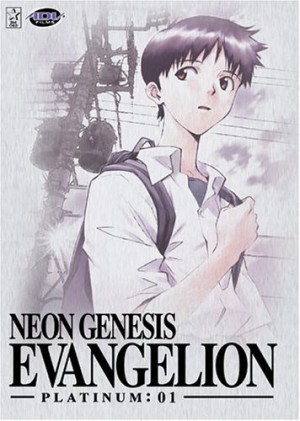
- Episodes: 26
- Aired: Oct 4, 1995 to Mar 27, 1996
There aren’t many things in life that I would read literary critical theory on, but the impact of science fiction on Japanese society, as showcased by Neon Genesis Evangelion is one. In a state of college finals induced delirium, I found myself on the 5th floor of our university’s library —a suffocating, dilapidated relic with far too many fluorescent lights and cheap wooden cubicles. I was racing through literary theory in a search to prove why Hamlet was gay (more or less) and stumbled upon an academic theory book devoted to the art of science fiction —and more specifically, anime. There was a paper to finish in T-minus 24 hours and there I was, reading with a sleep-deprived fascination, about the psychological importance of Shinji Ikari and existential loneliness.
It easily has the best theme song I’ve ever heard and is bubbling cesspool that generates endless memes, but the importance of Evangelion lies in the important questions that Shinji’s cowardice dares to ask. It isn’t a show that makes you forget, it’s a show that makes you think. After studying psychology and critical theory in school, the themes of Lacan and Freud were evident in the show (Oedipal complexes among them). The anime emotionally bares itself; as the viewer, we are let into the raw and self-doubting prison that is Shinji’s mind. That is even the backdrop for the show’s culmination, as Shinji must battle between uniting humanity or preserving his own independence. The show unabashedly probes depression, sexuality, and many other themes of mental isolation and perversity that are infrequently talked about in media and entertainment. Despite this, Evangelion leaves itself unclothed for the viewer’s examination.
Neon Genesis Evangelion Anime Trailer
2. Cowboy Bebop
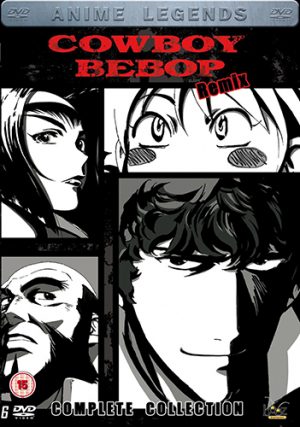
- Episodes: 26
- Aired: Apr 3, 1998 to Apr 24, 1999
See you, Space Cowboy. What more could anyone want from an anime other than a ragtag group of vagabond space bounty hunters with rogue morals cruising the galaxy together on a search for money and the shadows of the past? How about a visually stunning masterpiece with a jazzy score that seamlessly blends genres and makes the central narrative the character’s own selfish goals, rather than a unified plot that all members of the Bebop ship actively works towards? The blunt realism in a show as situated on fantasy as Cowboy Bebop is, truly cannot be rivaled.
Cowboy Bebop became something to obsess over. Although a horrible driver, I am a huge fan of road trips and receiving homemade CDs for my semi-outdated car is a gift that I never fail to enjoy. The result being that I have an ever-expanding collection of personalized music filled with horrible songs that my friends allow me to indulge in —an example being Hatsune Miku covers of pop punk followed by Death Grips followed by Korean pop. And of course, various anime themes, most notable of which is the intro from Cowboy Bebop. I can’t numerate how many hours exactly I’ve wasted driving along suburban back roads or long stretches of highway listening to Cowboy Bebop with friends, letting my hands go from the wheel just long enough to mime the sax solo (as I said, my driving has seen better days). For me, beyond the quality of the show itself, Cowboy Bebop will always be saturated in nostalgia, and because I can always return to that show pleasantly, it will always remain important to me.
Cowboy Bebop Trailer
1. Samurai Champloo
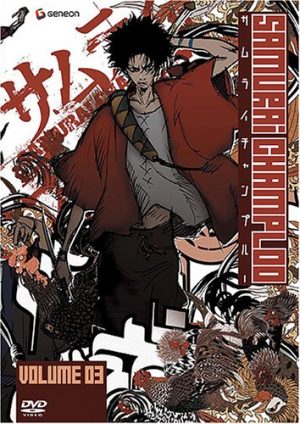
- Episodes: 26
- Aired: May 20, 2004 to Mar 19, 2005
A timeless masterpiece crafted by the hands of the anime Michelangelo, Samurai Champloo is a life changing piece of art that defies classification and ranking. I watched almost the entire series while trapped in my dorm’s common room, waiting for the lock on my roommate and I’s door to be fixed. Despite being curled up in a chair that had most-likely, at some point or another, been coated with a drunken student’s drool (or worse), I could not care less about my physical comfort. I was transfixed and everything else in the world had simply ceased existing. At that point, it was no longer about anime. The world of Samurai Champloo had become my temporary reality.
There are not many moments in life that I cry. And yet now, after watching the show and baring my raw heart, all it takes for me to tear up is a mere 30 seconds of any of the music showcased in the show. As a college freshman caught between both mourning and accepting the passing of my former life, the themes in Samurai Champloo hit hard. And again, this summer, before making my pilgrimage to Japan and leaving my American life behind, I had watched the series one more time with the friends I would soon enough be parting with. Above all, Samurai Champloo leaves the final impression of, not exactly undying friendship, but more of an acceptance that life changes. Change is inevitable. Painful, inevitable, and yet bitter-sweet, leaving a lingering happiness and hope in the small uncertainty of one day meeting again. The length of someone’s presence in your life does not diminish the impact they can have. And, as I looked towards my friend, I felt that impact. And I continue to feel that same impact every time I watch the show again.
Samurai Champloo Trailer
Conclusion
These anime changed my life. For the most part, these shows have never brought me pure happiness; instead, I’ve received questions or tears or validation on an existential question I had been previously considering. They demand responses from me and so I could not ignore them. And now, since they have irrevocably changed my life, I can not ever attempt to ignore them at all, not now and not ever. The simplest and most sincere advice I can give is to highly recommend that anyone else view these shows as well.

